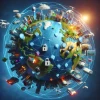
As the world stands on the brink of a telecommunications revolution, 5G technology is poised to transform how we interact with the digital realm. This isn't just about faster internet speeds; it's about a fundamental shift in connectivity that promises to redefine everyday internet use. From smart homes to mobile gaming, the ripple effects of 5G are vast and varied. Let's dive into how this technology is reshaping our daily lives and what it means for the future of internet use.
Understanding the Basics of 5G Technology
Before we delve into the impact, it's crucial to understand what 5G technology actually is. Simply put, 5G is the fifth generation of mobile network technology. It offers significantly faster data speeds, reduced latency, and the ability to connect more devices simultaneously. Imagine downloading a full HD movie in seconds or experiencing virtually lag-free video calls. That's the promise of 5G. However, the technology goes beyond speed. It has the potential to support a vast number of devices, making it a cornerstone for the Internet of Things (IoT).
Faster Internet Speeds: A Game Changer
One of the most talked-about benefits of 5G is its speed. Current 4G networks offer speeds up to 100 Mbps, while 5G promises up to 10 Gbps. This isn't just a marginal improvement; it's a quantum leap that opens up new possibilities. For instance, streaming 4K videos on the go without buffering becomes a reality. Gamers, too, will rejoice as 5G reduces latency, providing a smoother, more responsive experience. However, it's essential to note that achieving these speeds requires compatible devices and network infrastructure, which are still in the rollout phase.
Transforming Smart Homes and IoT
The impact of 5G extends beyond personal devices to the smart home ecosystem. With its ability to connect more devices seamlessly, 5G is set to revolutionize how we manage our homes. From smart refrigerators that can order groceries to security systems that provide real-time alerts, the possibilities are endless. However, as we embrace this technology, it's vital to address security concerns. More connected devices mean more entry points for cyber threats, emphasizing the need for robust cybersecurity measures.
5G in the Workplace: Boosting Productivity
In the professional sphere, 5G is poised to enhance productivity and streamline operations. Remote work becomes more efficient with faster, more reliable connections, enabling seamless video conferencing and real-time collaboration. Industries like healthcare can leverage 5G for telemedicine services, providing patients with faster access to care. However, businesses must be wary of the initial costs associated with upgrading infrastructure and training staff to use new technologies effectively.
Challenges and Considerations
While the benefits of 5G are significant, the transition isn't without its challenges. One major hurdle is the uneven rollout of 5G networks, which can create disparities in access and service quality. Additionally, there are concerns about the environmental impact of increased infrastructure and energy consumption. Users must also consider potential health risks, although current research suggests that 5G is safe. As with any new technology, it's essential to weigh these factors carefully.
Common Misconceptions About 5G
Despite its growing presence, 5G is often misunderstood. One common myth is that 5G will immediately replace 4G, but in reality, both will coexist for some time. Another misconception is that 5G is only about speed, overlooking its potential to revolutionize industries and enable new technologies. By understanding the true capabilities and limitations of 5G, users can better prepare for its integration into their lives.
The Future of 5G: What's Next?
As 5G continues to roll out globally, its full potential is yet to be realized. Future developments may include advanced applications in augmented reality (AR) and virtual reality (VR), offering immersive experiences for entertainment, education, and beyond. Moreover, 5G could pave the way for smart cities, where everything from traffic lights to waste management systems is interconnected. As we look to the future, it's clear that 5G will play a pivotal role in shaping a connected world.





























